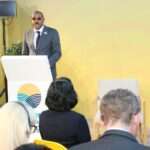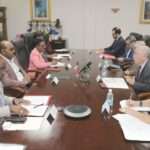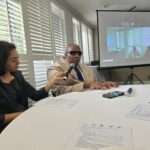
A pioneering initiative emerging from the groundbreaking Antigua and Barbuda Agenda for SIDS (ABAS) is being positioned to revolutionise how vulnerable island nations confront one of their most critical economic challenges, the unsustainable debt burdens brought on by the unending cycle of worsening climate impacts.
The Global SIDS Debt Sustainability Service (DSSS), a prominent feature of the ABAS framework, formed the basis of discussions during a side event at the United Nations yesterday in preparation for next year’s 4th International Conference on Finance for Development, in Seville Spain.
The Government of Antigua and Barbuda, through its expert team of officials at the Mission in New York, has been working assiduously over the past several days to ensure that key ambitions of the DSSS make it to the agenda of the conference, convened to address challenges in the international financial structure that make it difficult for many countries to achieve sustainable development.
The event was themed Empowering Resilient Futures: Reforming Financial Systems and Expanding Investment Pathways for SIDS and Vulnerable Nations. It was co-sponsored by the Governments of Antigua and Barbuda and the Republic of the Maldives, drawing on a multi-sectoral approach in defining a new financial landscape for SIDS.
Besides the focused attention that was applied to the DSSS and how it is envisioned to solve the debt crisis in SIDS, the meeting also brought special scrutiny to the impact of credit rating systems on accessing funding for vulnerable island states.
“The Global SIDS Debt Sustainability Support Service (DSSS) offers a comprehensive framework to address these challenges by focusing on debt sustainability, resilience investment, and advisory support,” explained Antigua and Barbuda’s Deputy Permanent Representative to the United Nations Tumasie Blair, the moderator of an engaging fireside chat where key points and ideas around the DSSS and the financial markets were ventilated.
Antigua and Barbuda’s Permanent Representative to the United Nations, Ambassador Walton Webson, was joined by his counterpart from the Maldives, Ali Naseer Mohamed, at the discussion. Ambassador Webson acknowledged the challenges and was adamant that cross sector collaboration that ensures SIDS engages with all players in the global financial system will be necessary in moving the ideals of the DSSS forward.
Meantime, Antigua and Barbuda’s Prime Minister the Hon. Gaston Browne was singled out for special praise in advocating for a recalibration of the international financial architecture and for reforms of the traditional credit rating system in particular.
Also joining the discourse to share wide ranging thoughts on the combination of financial issues impacting SIDS were New Zealand’s Permanent Representative to the United Nations, Carolyn Schwalger, St. Lucia’s Deputy Permanent Representative to the UN and Board Member of the Risk-Informed Early Action Partnership (REAP) Kimberly Louis and SIDS Senior Advisor at the United Nations Dr. Simona Marinescu.
Credit also goes to Ritu Bharadwaj, Loss and Damage Director at the International Institute for Environment and Development (IIED) for her sterling efforts in leading the design work on the DSSS and her unwavering advocacy in challenging global financial systems on behalf of SIDS.
Ultimately, as stakeholders prepare for next June’s Finance for Development Conference in Spain, Antigua and Barbuda is determined to continue the work until then in building consensus on the need for financial reforms and for promoting investment pathways that empower climate-vulnerable nations to achieve sustainable and resilient development.






0 Comments